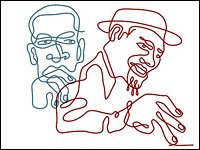short book review
Anyway, The Church Enslaved is an excellent book. While I don't think it has all the answers for dealing with race issues in the church, I do think it offers some unique perspectives. What is interesting is the final few chapters' focus on spirituality. It discusses contemplative prayer as a means of being able to see the image of Christ on those around you, black or white. They also get into alot of African spirituality. I won't go too deep into it here, but they identify the primary sin of the western church as individuality. In african spirituality (which has carried over into african theology) salvation is corporate. The goal of spirituality is to find yourself in the midst of and in the context of community. None of this "my personal savior" jargon that we throw around. I found that interesting. In theology we discussed salvation being corporate only briefly, but this might be a good move for the church to start making- towards corporate concepts of salvation.
Another concept from African theology that they discussed, and this connets with the contemplative prayer, is the idea of sacramentality. In short, instead of just seeing bread, wine, and water, as visible signs of invisible grace, sacramentality is seeing people, plants, rocks, the whole created order as visible signs of grace. Again this speaks to the interconnectedness of living things. Contemplative prayer is a means through which we are able to see the image of God in others.
The book ends with what feels like a plug for mission year. It is a mission organization that gives participants an immersion experience in an urban setting. The usually white participants go into a neighborhood where they are the minority. The work and serve and offer prayer with and for their new neighbors. They get hooked up with churches and support the leadership in the neighborhood without taking any leadership themselves. It's a great ministry (I know several people who have done it) and it offers a possible ew paradigm for thinking about interracial interactions and leadership dynamics.
I hardly scratched the surface here, but it is a quick read and definitely worth your time. Plus if more people read it then we can discuss it together...





